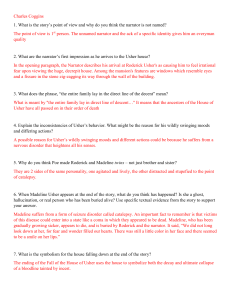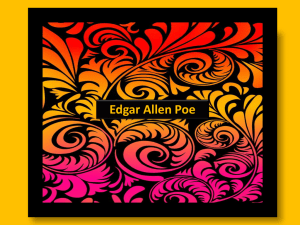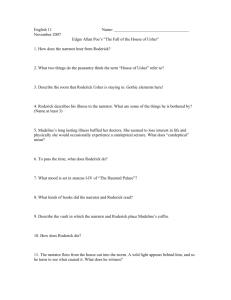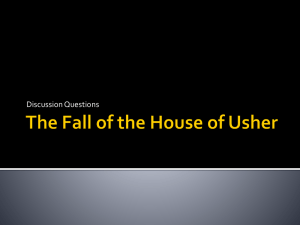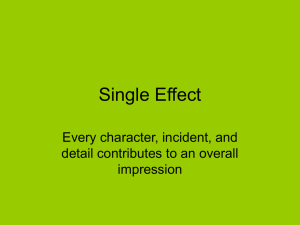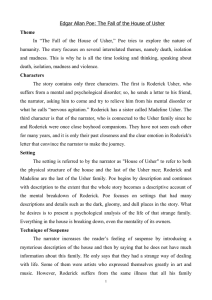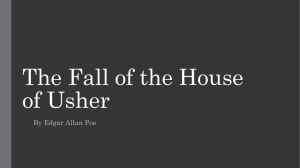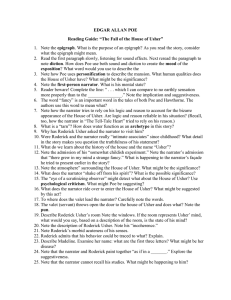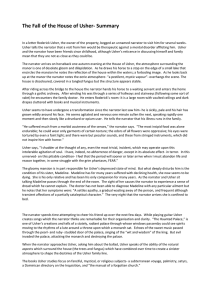Tough Text: Quarter 3 Week 4 January 25 – 29, 2016 The narrator of
advertisement
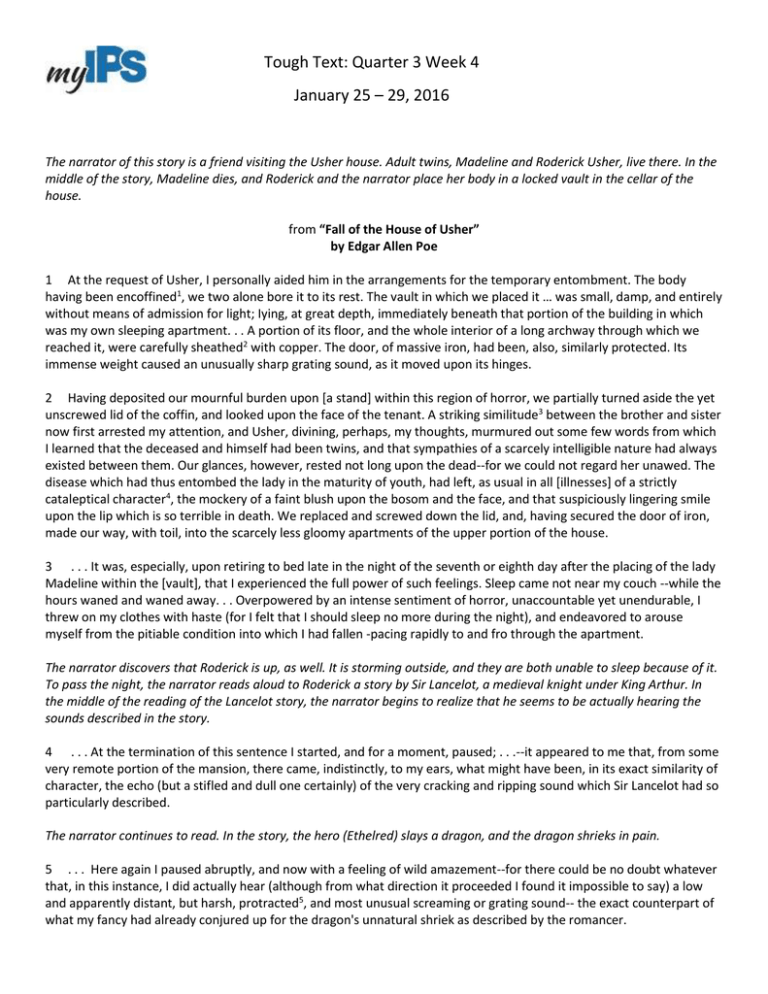
Tough Text: Quarter 3 Week 4 January 25 – 29, 2016 The narrator of this story is a friend visiting the Usher house. Adult twins, Madeline and Roderick Usher, live there. In the middle of the story, Madeline dies, and Roderick and the narrator place her body in a locked vault in the cellar of the house. from “Fall of the House of Usher” by Edgar Allen Poe 1 At the request of Usher, I personally aided him in the arrangements for the temporary entombment. The body having been encoffined1, we two alone bore it to its rest. The vault in which we placed it … was small, damp, and entirely without means of admission for light; Iying, at great depth, immediately beneath that portion of the building in which was my own sleeping apartment. . . A portion of its floor, and the whole interior of a long archway through which we reached it, were carefully sheathed2 with copper. The door, of massive iron, had been, also, similarly protected. Its immense weight caused an unusually sharp grating sound, as it moved upon its hinges. 2 Having deposited our mournful burden upon [a stand] within this region of horror, we partially turned aside the yet unscrewed lid of the coffin, and looked upon the face of the tenant. A striking similitude3 between the brother and sister now first arrested my attention, and Usher, divining, perhaps, my thoughts, murmured out some few words from which I learned that the deceased and himself had been twins, and that sympathies of a scarcely intelligible nature had always existed between them. Our glances, however, rested not long upon the dead--for we could not regard her unawed. The disease which had thus entombed the lady in the maturity of youth, had left, as usual in all [illnesses] of a strictly cataleptical character4, the mockery of a faint blush upon the bosom and the face, and that suspiciously lingering smile upon the lip which is so terrible in death. We replaced and screwed down the lid, and, having secured the door of iron, made our way, with toil, into the scarcely less gloomy apartments of the upper portion of the house. 3 . . . It was, especially, upon retiring to bed late in the night of the seventh or eighth day after the placing of the lady Madeline within the [vault], that I experienced the full power of such feelings. Sleep came not near my couch --while the hours waned and waned away. . . Overpowered by an intense sentiment of horror, unaccountable yet unendurable, I threw on my clothes with haste (for I felt that I should sleep no more during the night), and endeavored to arouse myself from the pitiable condition into which I had fallen -pacing rapidly to and fro through the apartment. The narrator discovers that Roderick is up, as well. It is storming outside, and they are both unable to sleep because of it. To pass the night, the narrator reads aloud to Roderick a story by Sir Lancelot, a medieval knight under King Arthur. In the middle of the reading of the Lancelot story, the narrator begins to realize that he seems to be actually hearing the sounds described in the story. 4 . . . At the termination of this sentence I started, and for a moment, paused; . . .--it appeared to me that, from some very remote portion of the mansion, there came, indistinctly, to my ears, what might have been, in its exact similarity of character, the echo (but a stifled and dull one certainly) of the very cracking and ripping sound which Sir Lancelot had so particularly described. The narrator continues to read. In the story, the hero (Ethelred) slays a dragon, and the dragon shrieks in pain. 5 . . . Here again I paused abruptly, and now with a feeling of wild amazement--for there could be no doubt whatever that, in this instance, I did actually hear (although from what direction it proceeded I found it impossible to say) a low and apparently distant, but harsh, protracted5, and most unusual screaming or grating sound-- the exact counterpart of what my fancy had already conjured up for the dragon's unnatural shriek as described by the romancer. The narrator continues to read. In the story, the dragon is dead and the hero attempts to lift from the wall a great brass shield. It is dropped upon the silver floor and makes a terrible and mighty ringing clatter. 6 . . . No sooner had these syllables passed my lips, than--as if a shield of brass had indeed, at the moment fallen heavily upon a floor of silver--I became aware of a distinct, hollow, metallic, and clangorous, yet apparently muffled reverberation6. Completely unnerved, I leaped to my feet; but the measured rocking movement of Usher was undisturbed. I rushed to the chair in which he sat. His eyes were bent fixedly before him, and throughout his whole countenance there reigned a stony rigidity. But, as I placed my hand upon his shoulder, there came a strong shudder over his whole person; a sickly smile quivered about his lips; and I saw that he spoke in a low, hurried, and gibbering murmur, as if unconscious of my presence. Bending closely over him, I at length drank in the hideous import of his words. 7 "Not hear it?--yes, I hear it, and have heard it. Long--long--long--many minutes, many hours, many days, have I heard it--yet I dared not--oh, pity me, miserable wretch that I am!--I dared not-- I dared not speak! We have put her living in the tomb! Said I not that my senses were acute7? I now tell you that I heard her first feeble movements in the hollow coffin. I heard them--many, many days ago--yet I dared not--I dared not speak! And now--to-night--Ethelred--ha! ha!--the breaking of the hermit's door, and the death-cry of the dragon, and the clangor of the shield!--say, rather, the rending of her coffin, and the grating of the iron hinges of her prison, and her struggles within the coppered archway of the vault! Oh whither shall I fly? Will she not be here anon? Is she not hurrying to upbraid8 me for my haste? Have I not heard her footstep on the stair? Do I not distinguish that heavy and horrible beating of her heart? MADMAN!" here he sprang furiously to his feet, and shrieked out his syllables, as if in the effort he were giving up his soul-- MADMAN ! I TELL YOU THAT SHE NOW STANDS [OUTSIDE] THE DOOR !" 8 As if in the superhuman energy of his utterance there had been found the potency of a spell--the huge antique [doors] to which the speaker pointed, threw slowly back, upon the instant, their [heavy] and ebony jaws. It was the work of the rushing gust--but then [outside of] those doors there DID stand the lofty and enshrouded figure of the lady Madeline of Usher. There was blood upon her white robes, and the evidence of some bitter struggle upon every portion of her emaciated9 frame. For a moment she remained trembling and reeling to and fro upon the threshold, then, with a low moaning cry, fell heavily inward upon the person of her brother, and in her violent and now final death-agonies, bore him to the floor a corpse, and a victim to the terrors he had anticipated. 1. encoffined – put in a coffin 2. sheathed – covered 3. similitude – similarity 4. cataleptical character – reference to medical condition that causes complete muscle rigidity and loss of contact with the environment 5. protracted – prolonged 6. reverberation – reechoed sound 7. acute – extremely sensitive 8. upbraid – to blame 9. emaciated – abnormal thinness due to malnutrition Tough Text: Quarter 3 Week 4 January 25 – 29, 2016 TEACHER NOTES Skill of the Week: Understanding text structures in literature Corresponding Standard: 9-10.RL.3.1: Analyze and evaluate how an author’s choices concerning how to structure a work of literature, order the events with it (e.g. parallel episodes), and manipulate time (e.g. pacing, flashbacks) create such effects as mystery, tension, or surprise. Notes: Use this text to specifically model and allow student practice with understanding text structures in literature. Example questions: o o o o o What is the order of events in the text? How does the author structure the events in the text? Is time manipulated in the text? How do you know? Are there parallel episodes happening? How do you know? Are there flashbacks? How do you know? Additional literacy skills may be incorporated (e.g. citing text evidence), but the primary focus while using this text should be the Skill of the Week. This text can also provide an opportunity for students to practice the Constructed Response strategy you have selected. The Constructed Response prompt should be reflective of the Skill of the Week. Example Constructed Response question: o What specific text structures does the author use in the text? Provide examples to support your response.

